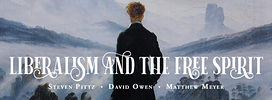In his essay and his initial reply to my response, Steven Pittz is at pains to emphasize that there is a spiritual dimension to liberalism and that our understanding of liberal freedom is incomplete unless it incorporates spiritual freedom alongside economic and political freedom. He is, of course, aware that he is not the first to make this claim—and here I want to go back to perhaps the first major inheritor of Nietzsche’s reflections on spiritual freedom and amor fati, namely, Max Weber. What is interesting about Weber for our concerns is that he shares the view that liberalism must, if it is not to die off, have what Pittz calls a spiritual dimension and one that can be related to the free spirit in Nietzsche’s sense, but that Weber locates the demands of such spiritual freedom in terms of the idea of ”calling” (Beruf) that he elaborates in his two great essays ‘Science as a Vocation’ and ‘Politics as a Vocation’. In each of these essays, Weber articulates the external and internal demands of the vocation, the requirements of “personality” (which is the gloss on spiritual freedom), as the distinct conditions of amor fati in each value-sphere.
A modern liberal political order is also an order in which one must choose between different value-orientations—the scholar, the politician and the artist, to pick the most obvious three, each commit themselves to an ultimate value that is incompatible with the alternatives, and which imposes its own inner demands as well as different external demands given the disparate organisation of science, politics and art in the modern state. In this way Weber sought to reconcile Nietzsche’s vision of free spirits with the sociological character of the modern capitalist bureaucratic state.
I introduce Weber into this discussion because I want to ask whether Pittz would endorse this approach to thinking about spiritual freedom in a liberal political order or whether his free spirits are to be seen in more purely aesthetic terms. My point here is that one might argue that the kind of aesthetic experience that Pittz aligns with the free spirit is the experience of seeing one life in terms of an ultimate value that foregrounds certain features and activities over others. It is in large part the value-orientation that “gives style to one’s character.” The importance of Weber is that he recognizes that such commitments are not solely composed of those inner demands that so excited his young audience but require affirming the mundane, tedious, and often dispiriting tasks that go along with being, for example, a scholar in a modern university or a politician in an age of party democracy. For the scholar, on Weber’s account, this means—despite whatever temptations may exist to the contrary—separating one’s work from one’s personal politics.
While I remain sympathetic to Pittz’s view that spiritual freedom matters for liberal society, the example of Weber brings into focus the point that an account of spiritual freedom in modernity has to wrestle with both the pluralism of values and the institutional make-up of modern social life.

